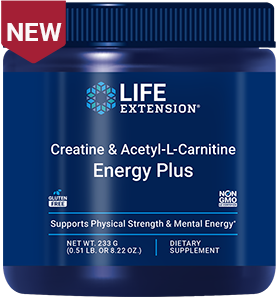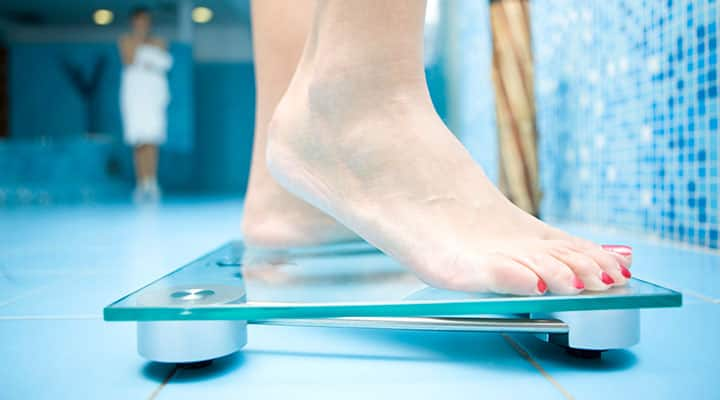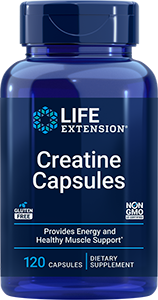
Does Creatine Make You Gain Weight?
Published: January 2025
Maybe during your last workout, you heard from a gym buddy that taking creatine—one of the more studied (and trending!) workout supplements—can contribute to lean muscle growth. However, that same person might've also told you that it can lead to weight gain.
Is this true, and if so, to what degree? In this blog, we'll explore the effects of creatine supplementation, why the scale might be fickle, and what you can do to stay on top of your weight.
How does creatine work in your body?
Let's start with a quick science lesson to better understand exactly what creatine is—and how it works with your goals, not against them.
Creatine is a naturally occurring amino compound that the body creates from the amino acids methionine, glycine and arginine. It can be found in your skeletal system, heart, muscle cells and brain—although most of it is found in your muscles. Creatine plays a vital role in the metabolism of energy in almost all of your tissues.
You may be wondering how exactly creatine plays a role in energy. Simple: It helps you recycle adenosine triphosphate (ATP)—your body's main source of cellular energy—in order to make energy that your cells can actually use. This helps you power up your workouts, and daily activities, especially if you are a woman.Does creatine make you gain weight?
Spoiler alert: The rumors aren't true! There isn't scientific evidence that you'll gain any lasting weight on creatine. What may initially seem like fat gain is actually the most common adverse effect of taking creatine—water weight. This is especially common when you first start supplementing and even more so during the loading phase—more on that in a minute!
To be clear, holding onto water can be due to a variety of factors and taking a creatine supplement does not automatically mean you will experience water weight.
And if you do, guess what? It will go away! Most people notice their water retention go down after the first several days of supplementing.
Muscle mass vs. water retention vs. fat gain
When we see the number on the scale climb, we know that there are three potential explanations: water retention, fat gain and muscle gain. First, we want to highlight that these are three different things.
Water retention
: This has numerous potential causes and is temporary. If you ate a meal that was extra salty or loaded with carbs and the scale is up a few pounds the next day, blame water retention.Muscle mass
: This takes more time and dedicated energy to build. Muscles connect and protect our bones and allow us to not only exercise but also perform everyday functions (including sitting up straight). Your skeletal muscles might comprise somewhere between 30% and 40% of your total body mass. The more muscle you have, the higher your total body energy expenditure. This is because your muscle cells use more energy than your body fat.Fat gain
: This is the kind of weight gain most of us want to avoid. It can happen (over time) if you consume more calories than your body needs to run optimally.
So, how do you know which was the cause of your (supposed) weight gain? If it seemingly happened overnight, it's likely water weight. If it's been a slow increase, it could be muscle, fat or potentially both. How can you tell the difference between the two? Well, if it's mostly muscle gain, you might see more definition. And, because muscle takes up less space than fat, you might notice a difference in the way your clothes fit.
This is a good opportunity to point out that while muscle takes up less space than fat, it's also more dense than fat. So, you could technically lose fat, gain muscle, maybe even drop a clothing size, and see your body weight go up. This is why the number on the scale doesn't tell the whole story.
Explore Our Best Active Lifestyle & Fitness Supplements
How to avoid weight gain on creatine
To clarify, we're referring to non-muscle weight gain, since you might have a goal of gaining muscle mass, which, as we covered, could ultimately lead to a higher number on the scale.
If it's water weight you're trying to avoid, then one approach is to bypass the loading phase many individuals go through when they start taking creatine.
Creatine loading means supplementing with a higher amount for roughly the first week (around 20 to 25 grams per day, split into smaller doses), and then drastically reducing the amount for the "maintenance" phase (approximately three to five grams per day).
It's important to note though: creatine loading isn't a bad thing just because it can lead to water retention. What we're describing here, rather, is two different approaches. Furthermore, the loading phase isn't necessary to enjoy the positive impacts of creatine, including stronger muscles and better performance and recovery.
What matters most is following the instructions on the label or the guidance of a healthcare provider. And perhaps, most importantly, taking creatine consistently and long-term is the best way to see results—with or without the loading phase.
Lastly, remember that since it's water weight and not fat gain, creatine should not get in the way of your weight loss goals, if you have them.
What is the fastest way to flush water retention?
If you feel like you're hanging onto a lot of water weight due to creatine supplementation, there are a few simple changes you can make to flush it out.
Increase your water intake
—We know this seems counterintuitive! When you do this, in a way, you "trick" your body and tell it, "Hey, you're getting plenty of water. No need to hang onto so much." And thus, you lose the water weight.How much water do you need? The easiest way to determine how much to drink is to look at the color of your urine. If it's a light-yellow pigment, you're in good shape. If it's a darker yellow and/or has a stronger smell, you might need to hydrate more.
Move your body
—Not only will you sweat out some of that retained water, but you'll also support blood flow, so water won't collect in your extremities.Consume less sodium and fewer carbs
—Both sodium and carbs can contribute to water retention. We're not telling you to cut them out entirely. However, if you notice that your diet consistently includes high-sodium and high-carb menu options, then it's worth considering swapping these out for other items that won't trigger water retention.Increase your potassium consumption
—Potassium plays a role in your body's ratio of water to salt. If you're carrying a lot of water weight, try eating more potatoes, bananas, beets or avocados, or look for a high-quality potassium supplement.Which type of creatine should I take?
Of the various types of creatine, the one you've probably heard the most about is creatine monohydrate—and for good reason! This popular form offers several benefits.
Creatine monohydrate fuels exercise performance, supports endurance, promotes recovery after a tough workout, helps you maintain lean muscle mass and supports your overall body composition.
In fact, a meta-analysis found that taking creatine while resistance training was more effective than resistance training alone when it came to improving lean body mass. This is why so many athletes use creatine as part of their daily nutrition.
Pro tip: Creatine is conveniently available in capsule or powder form, so you can choose how you prefer to supplement.
How do you take creatine?
If you want to use creatine for muscle growth, it's always best to follow the directions on the product label. In terms of the timing of creatine supplementation on gym days, it's smart to take it shortly before or after your workout. But, whether it's an active day or a recovery day, consistency is everything. You should take creatine daily to get the most out of its benefits.
We also want to offer a gentle reminder: Creatine isn't a replacement for good nutrition. No supplement is. Proper nutrition means eating a colorful diet (lots of fruit and vegetables) alongside rich sources of protein and whole grains, while minimizing heavily processed foods. Your diet doesn't have to be perfect, but you should follow a healthy eating plan like the Mediterranean diet.
And remember, changing your body composition is a marathon, not a sprint! Don't let a (temporary) pound or two get in your way. The combination of nutrition, strength training and creatine play very well together.
Resources
- Antonio, Jose, et al. "Common questions and misconceptions about creatine supplementation: what does the scientific evidence really show?" J Int Soc Sports Nutr. February 2021. https://pmc.ncbi.nlm.nih.gov/articles/PMC7871530/
- Burini RC. "The Meaning of Muscle Mass for Health, Disease, and Strength Exercises." Handbook of Anthropometry. January 2012. https://link.springer.com/chapter/10.1007/978-1-4419-1788-1_107
- Desai I, et al. "The Effect of Creatine Supplementation on Resistance Training-Based Changes to Body Composition: A Systematic Review and Meta-analysis." J Strength Cond Res. July 2024. https://pubmed.ncbi.nlm.nih.gov/39074168/
- Kreier RB, Stout JR. "Creatine in Health and Disease." Nutrients. January 2021. https://pmc.ncbi.nlm.nih.gov/articles/PMC7910963/
- Spruce N. "What Does Creatine Do & Why You Should Use It For Muscle Growth." NASM. https://blog.nasm.org/creatine-explained
- "Skeletal Muscle." Cleveland Clinic. September 2021. https://my.clevelandclinic.org/health/body/21787-skeletal-muscle
Always be in the know!
Access the latest deals, wellness news, expert health tips & more!












